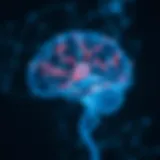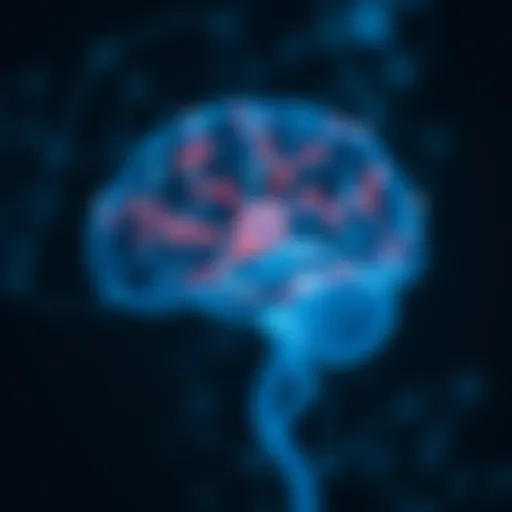Comprehensive Review of Renal Cell Carcinoma Treatments


Intro
Renal cell carcinoma (RCC) has seen significant evolution in treatment strategies over the last few decades. With each advancement in technology and understanding of the disease, the landscape of therapeutic options continues to expand. Effective management of RCC requires a nuanced approach, addressing both individual patient needs and the biological characteristics of the tumor. This introductory section will lay the groundwork for understanding this complex topic, framing the discussion for subsequent sections.
Overview of Research Topic
Brief Background and Context
RCC, the most common type of kidney cancer, originates in the lining of the renal tubules. It constitutes approximately 3% of all cancers in adults and is notorious for its variable clinical behavior. The incidence of RCC has risen in recent years, attributed to increased screening and a greater awareness of risk factors, including smoking and obesity. The prognosis varies widely, depending on factors such as tumor size, grade, and stage at diagnosis. Historically, treatment options were limited, but recent advancements have paved the way for more targeted therapies and surgical approaches.
Importance in Current Scientific Landscape
The treatment of RCC holds paramount significance in the medical field due to its implications for patient quality of life and survival outcomes. As understanding of tumor biology improves, personalized medicine emerges in the forefront, leading to a need for constant adaptation of therapeutic strategies. Furthermore, ongoing clinical trials exploring new agents and combinations of therapies are crucial. This multi-faceted approach lays a strong foundation for better patient outcomes and underscores the dynamic nature of RCC management.
Methodology
Research Design and Approach
In preparing this review, a comprehensive literature search was conducted. The study focused on recently published articles in peer-reviewed journals related to RCC treatment. The aim was to assess the latest findings and recommendations for clinical practice. Emphasis was placed on gathering data from diverse sources, ensuring a holistic view of current methodologies.
Data Collection Techniques
Data was collected through systematic reviews of clinical trials, meta-analyses, and case studies. This process involved analyzing both qualitative and quantitative findings. Sources such as PubMed, ClinicalTrials.gov, and institutional databases were extensively utilized. Each piece of information was examined critically to maintain accuracy and relevancy in the rapidly evolving field of RCC treatment.
"A thorough understanding of renal cell carcinoma treatments not only informs the clinical decisions but also shapes the future directions in oncology research."
The convergence of surgical interventions, such as nephrectomy, with systemic therapies exemplifies the collaborative effort in managing this disease. It is vital to regularly update knowledge in this area, as new findings emerge that could significantly alter treatment algorithms. The following sections will delve deeper into specific treatments, highlighting both established and innovative approaches.
Intro to Renal Cell Carcinoma
Renal Cell Carcinoma (RCC) stands as a significant area of study within oncology, influencing both clinical practices and patient outcomes. Understanding RCC is critical due to its increasing incidence and varying management strategies. The treatment landscape for RCC has evolved over recent years, adapting to both advancements in medical technologies and an increased understanding of the tumor's biology. This section aims to lay the foundation for a comprehensive understanding of RCC, covering its definition, epidemiology, and pathophysiology. Through careful exploration, it hopes to underscore the complexity of RCC and the necessity for tailored treatment approaches.
Definition and Types of RCC
Renal Cell Carcinoma refers to a diverse group of kidney cancers characterized by malignant cell growth in the renal epithelium. It typically originates in the proximal tubules of the kidneys. RCC can be classified into several types, with clear cell, papillary, and chromophobe being the most common. Each subtype exhibits distinct histological features and prognostic implications. Clear cell RCC, comprising nearly 70-80% of all cases, is linked to genetic alterations in the von Hippel-Lindau (VHL) gene. In contrast, papillary RCC demonstrates multifocality and is divided into two subtypes, both of which respond differently to treatment. Proper classification aids in determining the most effective treatment strategies based on the tumor’s biological behavior and patient-specific factors.
Epidemiology of RCC
The epidemiology of Renal Cell Carcinoma reveals significant trends in incidence and mortality that reflect both demographic changes and lifestyle factors. Globally, RCC accounts for approximately 3% of all adult cancers. The incidence is predominately higher in men than women, with a peak occurrence in the sixth and seventh decades of life. Risk factors linked to RCC include smoking, obesity, hypertension, and specific genetic predispositions. The correlation between these risk factors and RCC emphasizes the need for awareness and proactive prevention strategies. As the demographic landscape shifts, understanding these epidemiological trends will be crucial in tailoring public health initiatives.
Pathophysiology of RCC
The pathophysiology of Renal Cell Carcinoma is complex and multifactorial. RCC development often involves genetic mutations, epigenetic alterations, and aberrant growth signaling pathways. One of the pivotal mechanisms is the inactivation of the VHL gene, which leads to the stabilization of hypoxia-inducible factors (HIFs), promoting angiogenesis and tumor growth. Other notable pathways include the mTOR pathway, which is crucial for cell growth and metabolism, providing potential targets for therapeutic interventions. Understanding these mechanisms sheds light on potential therapeutic targets and personalized treatment approaches. Overall, the intricate pathophysiological framework supports the importance of ongoing research to unravel the underlying mechanisms contributing to RCC.
Diagnosis of Renal Cell Carcinoma
The diagnosis of renal cell carcinoma (RCC) is a critical component in the management of this type of cancer. Early detection is essential for improving patient outcomes and ensuring the selection of the most appropriate treatment modalities. Given that RCC often presents with nonspecific symptoms, understanding how to identify the condition effectively is vital. In this section, we will explore the clinical presentation, imaging techniques, and biopsy procedures that play a significant role in diagnosing RCC.
Clinical Presentation
The clinical presentation of renal cell carcinoma can vary widely among patients. Some individuals exhibit classic symptoms, while others may have subtle signs.
Common symptoms include:
- Hematuria: Blood in the urine is often the first symptom reported by patients.
- Flank Pain: Patients may experience pain in the side or back.
- Palpable Mass: A mass may be felt in the abdominal area.
- Unexplained Weight Loss: Many patients notice significant weight loss without any apparent cause.
- Fatigue: A general feeling of tiredness is frequently reported.
However, many patients remain asymptomatic in the early stages of RCC. This highlights the importance of routine medical evaluations, especially for those at higher risk. Risk factors include smoking, obesity, and a family history of kidney cancer. Identifying these risk factors prompts clinicians to perform appropriate screenings. Early diagnosis can significantly influence treatment strategies and overall prognosis.
Imaging Techniques
Imaging is a primary method for diagnosing renal cell carcinoma. Various techniques are employed to visualize the kidney and assess for the presence of tumors. The most commonly utilized imaging modalities include:
- Ultrasound: This is often the first imaging test performed when a mass is suspected. It is safe, cost-effective, and does not involve radiation. It can help distinguish between solid and cystic lesions.
- Computed Tomography (CT): CT scans provide detailed images and are particularly useful for staging the disease. They can identify tumor size and density and evaluate for lymph node involvement or metastasis.
- Magnetic Resonance Imaging (MRI): Although less frequently used, MRI is an excellent alternative for patients who should avoid radiation, such as pregnant women. It also helps assess complex cystic lesions.
Early imaging can provide crucial information for determining the appropriate intervention and is essential for staging.
Accurate imaging is fundamental to making informed decisions regarding treatment options and understanding the disease's extent.
Biopsy and Histopathological Analysis
While imaging techniques can suggest the presence of RCC, a definitive diagnosis often requires a biopsy. The biopsy procedure allows for histopathological analysis, which is critical for determining the tumor type and grade.


There are primarily two methods for biopsy:
- Percutaneous Needle Biopsy: This technique uses imaging guidance to insert a needle into the kidney to obtain tissue samples. It is minimally invasive and can be performed as an outpatient procedure.
- Surgical Biopsy: In some cases, especially when the initial biopsy is inconclusive, a surgical biopsy may be necessary. This provides a comprehensive sample and allows for staging during a larger surgical procedure.
The histopathological analysis helps in:
- Confirming the diagnosis of RCC.
- Determining tumor grade and subtype, impacting prognosis and treatment strategy.
Staging of Renal Cell Carcinoma
Understanding the staging of renal cell carcinoma (RCC) is crucial for proper treatment planning and prognostication. The stage of cancer indicates its extent and helps guide therapeutic decisions. Staging assesses whether the tumor has remained localized to the kidney or has metastasized to other organs. Knowing the stage also influences the choice of surgical or systemic treatments. Hence, accurate staging is paramount, affecting not just immediate treatment strategies but also long-term outcomes for patients.
TNM Staging System
The TNM staging system is the standard classification method used to describe the extent of RCC. This system considers three key components:
- T for tumor size and extent.
- N for regional lymph node involvement.
- M for the presence of metastasis to distant organs.
Each category is designated by a number or letter that signifies the specifics of each situation. For example, a higher T number often indicates a larger tumor or more advanced local spread. This staging allows clinicians to devise a personalized treatment regimen based on individual patient profiles and tumor characteristics. It helps categorize patients not just for clinical treatment but also for potential enrollment in clinical trials.
Prognostic Indicators
Prognostic indicators are factors that help predict patient outcomes following RCC diagnosis and treatment. These indicators are vital for patient management and follow-up. Some common prognostic indicators include:
- Tumor Grade: Higher grades often correlate with poorer prognosis.
- Performance Status: This reflects the patient’s overall health and ability to perform everyday activities.
- Histological Subtype: Different subtypes of RCC can have varying behaviors and outcomes.
- Presence of Symptoms: Patients presenting with symptoms tend to have a worse prognosis.
Understanding these prognostic factors can improve treatment strategies and provide insight into expected outcomes, enabling better communication about prognosis between the healthcare team and patients.
Staging and prognostic indicators play a critical role in optimizing RCC management. Accurate assessment is necessary to provide patients with the best possible outcomes.
Surgical Treatment Options
Surgical treatments are a cornerstone in the management of renal cell carcinoma (RCC). They aim to remove primary tumors while preserving as much kidney function as possible. The choice between surgical options largely depends on tumor size, location, and the patient’s overall health.
Surgery can significantly impact the patient’s prognosis, making it pivotal in RCC treatment. Understanding the types of surgical interventions available helps in making informed decisions tailored to individual patient circumstances.
Radical Nephrectomy
Radical nephrectomy involves the complete removal of the affected kidney along with surrounding fatty tissue and regional lymph nodes. This method is often indicated for larger tumors or those that have invaded surrounding structures.
Key points regarding radical nephrectomy include:
- Survival Advantage: Studies show this approach can lead to improved overall survival in appropriately selected patients.
- Considerations: Patients must be evaluated for renal function preoperatively since removal of the kidney impacts long-term renal health.
- Complications: While effective, complications such as hemorrhage and infection may arise, and careful postoperative management is crucial to mitigate risk.
Partial Nephrectomy
Partial nephrectomy, or kidney-sparing surgery, removes only the tumor and a small margin of healthy tissue. This approach is preferred for smaller tumors, particularly in patients with solitary kidneys or those at risk of chronic kidney disease.
Highlights of partial nephrectomy include:
- Preservation of Renal Function: This technique minimizes loss of kidney function, which is especially important in patients with pre-existing renal impairment.
- Indications: It is indicated for smaller, localized tumors that do not threaten surrounding organs.
- Outcomes: Evidence indicates comparable cancer control rates to radical nephrectomy in certain cases, making this a viable option for many patients.
Laparoscopic Techniques
Laparoscopic techniques represent a minimally invasive alternative to traditional open surgery for treating RCC. This method uses small incisions and specialized instruments, offering significant advantages.
Advantages of laparoscopic approaches include:
- Reduced Recovery Time: Patients often experience shorter hospital stays and quicker postoperative recovery compared to open surgery.
- Less Pain: The reduced incision size translates to less postoperative discomfort, allowing for faster return to daily activities.
- Less Scarring: Laparoscopy typically results in minimal scarring, which can be a consideration for many patients.
In summary, surgical options for renal cell carcinoma play a critical role in treatment strategies. Understanding the merits and limitations of radical nephrectomy, partial nephrectomy, and laparoscopic techniques is essential for optimizing patient outcomes.
Systemic Treatments for RCC
Systemic treatments play a crucial role in the management of renal cell carcinoma (RCC). Unlike localized treatments such as surgery, systemic therapies target cancer cells throughout the body. This approach is particularly important for advanced stages of RCC, where the disease has spread beyond the kidneys. The goal of systemic treatments is to improve survival rates, reduce tumor burden, and alleviate symptoms while considering the patient's overall quality of life.
The systemic treatment landscape for RCC has evolved significantly over recent years. It includes various therapeutic options, notably targeted therapies, immunotherapy, and chemotherapy. Each modality has unique mechanisms of action, profiles of efficacy, and potential side effects. Understanding these nuances is essential for clinicians, patients, and researchers alike.
Targeted Therapies
Targeted therapies have changed the treatment paradigm in RCC. These drugs specifically inhibit pathways that promote tumor growth and progression. For example, agents like Sorafenib and Sunitinib target vascular endothelial growth factor (VEGF) receptors, which play a role in tumor angiogenesis. They tend to have fewer adverse effects compared to traditional chemotherapy, which can be broad and non-specific. Targeted therapies can lead to improved progression-free survival in patients with advanced RCC, making them a cornerstone in modern oncological practice.
Nevertheless, resistance to targeted therapies can develop over time. This resistance may limit the long-term efficacy of treatments. Regular monitoring and adjusting therapeutic strategies according to patient response are necessary. Moreover, it’s important to identify which patients are optimal candidates for targeted therapies using specific prognostic tools.


Immunotherapy Approaches
Immunotherapy represents another significant advancement in RCC treatment. Rather than directly killing cancer cells, immunotherapies enhance the body's immune response against the tumor. Checkpoint inhibitors, like Nivolumab and Pembrolizumab, have shown promising results. They work by blocking proteins that prevent immune cells from attacking cancer, thus reinvigorating the immune response.
Clinical trials indicate that immunotherapy can result in durable responses in some patients, even those who have become resistant to other forms of treatment. Furthermore, the landscape of immunotherapy is expanding, with ongoing research focusing on combination approaches to optimize effectiveness. The emergence of biomarker-driven therapies tailored to individual patients continues to push this field forward.
The use of immunotherapy in renal cell carcinoma treatment highlights an evolutionary shift toward utilizing biological mechanisms for cancer management.
Chemotherapy in RCC
Historically, chemotherapy was standard in treating various cancers. However, in RCC, its role is limited when compared to other modalities. Traditional chemotherapeutic agents often yield suboptimal outcomes due to the inherent resistance of RCC cells. Many oncologists now reserve chemotherapy for cases where other systemic therapies have failed.
Nonetheless, ongoing research into combination regimens may offer new perspectives. Some studies explore combining chemotherapy with targeted therapies or immunotherapy, aiming to enhance overall efficacy. While chemotherapy remains a less favorable option in RCC, its potential role in clinical practice cannot be entirely dismissed in specific cases.
In summary, systemic treatments for RCC are multifaceted and continue to evolve. The advances in targeted therapies and immunotherapy reflect a significant shift towards more personalized and effective approaches. Addressing the challenges of treatment resistance and ensuring equitable access to these therapies are critical as RCC management continues to develop.
Personalized Medicine in RCC Treatment
Personalized medicine, also known as precision medicine, is becoming a pivotal concept in the management of renal cell carcinoma (RCC). This approach tailors treatment based on individual patient characteristics, including genetic, environmental, and lifestyle factors. The shift toward personalized treatment acknowledges that RCC is not a single disease but rather a collection of related tumors with distinct molecular profiles. These profiles guide treatment choices and improve the likelihood of achieving positive outcomes.
Genetic Profiling
Genetic profiling plays a critical role in personalized medicine for RCC. By examining specific genetic mutations and alterations, clinicians can better understand the underlying mechanisms of the cancer. This information is invaluable for predicting the tumor's behavior and response to various treatments. For instance, mutations in the VHL gene are common in RCC, particularly in clear cell carcinoma. Knowing if a patient carries such mutations helps healthcare providers to choose the most effective therapies based on the tumor's biology.
Moreover, targeted therapies, such as sunitinib and pazopanib, are often more effective in patients with specific genetic profiles. Genetic profiling not only helps in treatment selection but also in identifying patients who may benefit from clinical trials of new drugs, further advancing the field.
Biomarkers and Their Implications
Biomarkers are measurable indicators that can signify the presence or progression of RCC. Their role in personalized medicine is expanding, as they can provide insight into treatment efficacy and prognosis. Common biomarkers in RCC include programmed death-ligand 1 (PD-L1) and various angiogenic factors.
The identification of biomarkers can guide clinicians in selecting appropriate immunotherapies. For example, patients with elevated PD-L1 expression may respond favorably to immune checkpoint inhibitors like nivolumab or pembrolizumab. Furthermore, ongoing research into novel biomarkers continues to evolve, aiming to develop more robust tools for prognosis and treatment response prediction.
"Biomarkers are a beacon that guide therapeutic decision-making, transforming the landscape of RCC management."
Adopting biomarker-focused strategies not only enhances the personalization of treatment but also holds promise for improving outcomes in RCC patients. Knowledge of biomarkers ultimately drives the implementation of tailored therapeutic interventions, fostering a move towards more effective cancer care.
Adjuvant and Neoadjuvant Therapies
The roles of adjuvant and neoadjuvant therapies are critical in the management of renal cell carcinoma (RCC). These treatment options aim to improve outcomes by reducing the risk of recurrence after surgery or by shrinking tumors prior to surgical intervention. The use of adjuvant and neoadjuvant therapies is becoming more prevalent as research demonstrates the positive impact they can have on patient prognosis.
Indications for Adjuvant Therapy
Adjuvant therapy is typically recommended for patients who have undergone surgical resection of RCC. The need for this therapy arises from several clinical factors, which should be considered thoroughly. Key indications include:
- High-risk features such as large tumor size, positive margins during surgery, and the presence of sarcomatoid or rhabdoid features.
- Stage of cancer, with higher-stage tumors more likely to benefit from adjuvant therapy.
- Histological subtype, where specific types of RCC, such as clear cell carcinoma, may respond better to targeted treatments.
- Patient's overall health and performance status, as resilience can affect both the type and timing of additional therapies.
Utilizing adjuvant therapy can reduce the risk of metastasis. It is also important to assess the potential side effects and monitor them closely. The patient’s preferences should also factor into the decision-making process, ensuring that treatment aligns with their overall goals.
Neoadjuvant Treatment Strategies
Neoadjuvant therapy serves a different purpose: it is given before surgery to reduce tumor size, making surgical removal more effective.
Key strategies in terms of neoadjuvant treatment include:
- Targeted therapy, using agents like sunitinib or axitinib, has shown promise in shrinking tumors prior to surgery.
- Immunotherapies, such as nivolumab, are also explored. It can potentially strengthen the patient's immune response against the tumor.
- Combination therapies may involve using both targeted and immunological agents, aiming to boost overall effectiveness.
The benefits of neoadjuvant therapy extend beyond just tumor reduction. It can give clinicians valuable insights into how the tumor responds to treatment, which can inform postoperative management.
“The integration of both adjuvant and neoadjuvant therapies represents the evolving nature of RCC treatment, emphasizing a more personalized approach.”
These therapies also facilitate better patient engagement in treatment planning. Ultimately, the decision on whether to pursue adjuvant or neoadjuvant treatment should be individualised based on tumor characteristics, patient specifics, and the latest clinical guidelines.
Recent Advances in RCC Research
Recent advances in renal cell carcinoma (RCC) research have significantly transformed the landscape of treatment options and patient management. Emerging strategies and insights derived from clinical studies are crucial for enhancing outcomes. This section will scrutinize the evolving methodologies in RCC treatment and the critical role of ongoing research in driving innovation. Understanding these advances is essential for healthcare professionals to provide optimal patient care and for researchers to identify areas requiring further exploration.
Clinical Trials Overview
Clinical trials serve as the backbone of medical advancement, particularly in oncology. They are essential for determining the effectiveness and safety of new treatments before they become standard practice. In the field of RCC, numerous trials are underway, focusing on innovative therapies and treatment combinations. For example, trials are exploring the use of novel immunotherapies, combined with targeted therapies, to increase the chances of positive outcomes.
Key points regarding clinical trials in RCC include:
- Eligibility Criteria: Patients with specific characteristics are recruited to ensure the relevance and accuracy of findings.
- Randomization: Many trials involve randomized control groups to compare new treatments against standard options.
- Endpoints: Researchers often focus on progression-free survival, overall survival, and quality of life as key endpoints to evaluate success.
- Emerging Models: Some trials are using adaptive designs, allowing modifications based on interim results, enhancing trial efficiency.


Ongoing clinical trials are vital for understanding the heterogeneity of RCC and exploring its nuances, further paving the way for personalized treatment options.
Breakthrough Drug Developments
Breakthrough drug developments have marked a new era in RCC treatment, particularly with the advent of targeted and immunotherapies. Recent approvals by regulatory agencies have provided more options for patients, often beyond conventional chemotherapy approaches. Notable breakthroughs include:
- Nivolumab: An immune checkpoint inhibitor that has shown promising results in advanced RCC, often in combination with other agents.
- Cabozantinib: A multi-kinase inhibitor that targets various pathways involved in tumor growth and angiogenesis, demonstrating improved outcomes in certain patient populations.
- Atezolizumab: Another immune checkpoint blocker, working effectively as monotherapy or with targeted therapies.
These new drugs offer several benefits such as:
- Enhanced Efficacy: Many new agents show improved response rates compared to previous treatments.
- Fewer Side Effects: Some targeted and immunotherapies have a more favorable side effect profile compared to traditional chemotherapy.
- Personalization: The ability to tailor treatments based on the patient's specific tumor characteristics and genetic profile.
Research advances in RCC drugs not only promise a shift in treatment paradigms but also open new horizons for patient survivorship and quality of life.
In summary, the recent research in RCC highlights the critical importance of clinical trials and breakthrough drug developments in shaping effective treatment strategies. Staying informed about these changes is vital for healthcare professionals, patients, and researchers alike, ensuring the best possible outcomes in renal cell carcinoma management.
Challenges in RCC Treatment
Understanding the challenges in renal cell carcinoma (RCC) treatment is crucial in the context of this article. RCC presents multiple hurdles that impact patient outcomes and the effectiveness of available therapies. Treatment resistance, adverse effects, and healthcare disparities are significant elements that can complicate management strategies and alter treatment pathways.
Treatment Resistance
Treatment resistance is a prominent issue in RCC management. Many patients initially respond to therapies; however, resistance can lead to treatment failure. The mechanisms behind resistance are complex and varied, including genetic mutations and tumor heterogeneity. For instance, tumors may develop alterations in signaling pathways that diminish the efficacy of targeted therapies. Research is ongoing to understand these mechanisms better, which is essential for developing strategies to overcome resistance, tailoring therapies to individual patients, and improving overall outcomes.
Adverse Effects of Treatments
Adverse effects associated with RCC treatments can significantly affect patients' quality of life. Surgical procedures, targeted therapies, and immunotherapeutic agents all carry potential side effects. Some common problems include fatigue, nausea, and skin reactions. These adverse effects can sometimes lead to treatment discontinuation or dose modifications, impacting the overall effectiveness of the therapy. Understanding and managing these side effects through supportive care is vital, which allows patients to adhere to their treatment regimens while maintaining a certain quality of life.
Healthcare Disparities in Access to Care
Healthcare disparities present a formidable challenge in the treatment of RCC. Factors such as socioeconomic status, geographic location, and racial or ethnic background can influence access to high-quality medical care. Patients in underserved communities may experience delays in diagnosis, insufficient treatment options, and inconsistent follow-up care. This inequity can ultimately lead to poorer outcomes for these populations. Addressing these disparities requires systemic changes in healthcare delivery, policy interventions, and increased awareness among healthcare providers to ensure that all patients receive equitable treatment.
"Understanding the dynamics of treatment resistance and the implications of adverse effects is essential for improving patient outcomes."
In summary, the challenges associated with RCC treatment are multifaceted, necessitating a comprehensive approach and a persistent effort to enhance strategies to overcome them.
Future Directions in RCC Treatment
Renal Cell Carcinoma (RCC) treatment is under continual advancement, and understanding the future directions can significantly inform patient outcomes and clinical practice. As therapy for RCC becomes increasingly personalized, developments in treatment modalities will likely change the standard of care. This section highlights factors that drive these advancements, the relevance of ongoing research, and the potential impact of new findings on RCC management.
Emerging Treatment Modalities
Emerging treatment modalities are crucial as they represent potential new avenues for managing RCC. Recent studies emphasize therapies that target specific molecular pathways associated with tumor growth. This precision approach, including molecularly targeted agents and combination therapies, allows for more effective and safer options for patients. The integration of drugs like cabozantinib and nivolumab showcases how tailored treatment can result in improved management of advanced RCC.
Additionally, the role of immune checkpoint inhibitors has gained attention. Drugs like pembrolizumab have shown promising results in stimulating the immune response against cancer cells. Research is ongoing into optimizing these treatments for various patient populations, including those with different histologic subtypes of RCC.
Furthermore, investigations are pursuing adoptive cell therapies, such as CAR T-cell therapy, and their implications for RCC. Initial trials demonstrate potential benefits, although more extensive studies are necessary to validate effectiveness and safety. This ongoing research offers hope for patients with limited treatment options today.
Integration of Research into Clinical Practice
Translating research findings into clinical practice is essential for the advancement of RCC treatment. The collaboration between researchers and clinicians fosters a better understanding of how new therapies can be integrated into existing treatment frameworks. The rapid pace of scientific discovery calls for continuous education among healthcare providers, ensuring they remain informed about emerging options.
Clinical trials play a vital role in this integration process. They not only offer access to cutting-edge therapies but also contribute valuable data to refine treatment guidelines. By implementing findings from clinical trials into everyday practice, factors like patient heterogeneity and tumor biology can be better addressed.
Moreover, discussions about value-based care are gaining traction. As new therapies enter the market, healthcare professionals must carefully evaluate not just efficacy but also the cost-effectiveness of treatments. This evaluation can guide decisions about which modalities yield the best outcomes for RCC patients across diverse healthcare settings.
"The future of RCC treatment lies in a precise and personalized approach that integrates ongoing research with clinical practice to enhance patient care."
In summary, focusing on emerging modalities and the integration of research findings into clinical workflows is critical for shaping the future of RCC treatment. This forward-thinking approach will not only enhance treatment efficacy but also optimize patient care, paving the way for better outcomes in RCC management.
End
In the realm of renal cell carcinoma (RCC) treatment, the concluding insights synthesize the vital concepts presented in this article. Understanding the nuances of RCC therapies is crucial for improving patient outcomes and advancing clinical practice. Several key elements emerge from the review of current treatments and research advancements.
Summary of Current Treatments
Current approaches to treating RCC encompass a range of strategies that include surgery, targeted therapies, and immunotherapy. The choice of treatment depends largely on the stage of cancer, patient’s overall health, and individual preferences.
- Surgical Treatments: These remain a cornerstone of RCC management. Radical nephrectomy and partial nephrectomy are commonly employed procedures that effectively remove tumors while preserving kidney function whenever possible.
- Targeted Therapy: This method focuses on specific pathways critical to cancer growth. Drugs such as sunitinib and axitinib have shown effectiveness in managing advanced disease.
- Immunotherapy: This innovative approach harnesses the body's own immune response to fight cancer. Agents like nivolumab and pembrolizumab have significantly changed the treatment landscape, providing new hope for patients with advanced RCC.
Each of these treatment modalities plays a distinct role in the comprehensive management of RCC. By integrating these approaches, a multi-faceted treatment plan can be tailored for each patient.
Importance of Continued Research
Ongoing research is vital for enhancing our understanding of RCC and improving treatment outcomes. Continued investigatons provide insight into various aspects of RCC treatment, from genomics to novel therapies. Some important considerations include:
- Exploring Biomarkers: Understanding genetic variations can lead to more personalized treatment options, maximizing efficacy while minimizing adverse effects.
- Clinical Trials: Participation in clinical trials offers patients access to cutting-edge therapies, while also contributing to the wider body of knowledge on RCC management.
- Addressing Disparities: Research can help illuminate the disparities in access to care and treatment outcomes among different patient populations, driving efforts to create equitable healthcare.
In summary, the importance of ongoing research cannot be overstated. It plays a fundamental role in paving the way for future RCC treatments and improving care standards. As the landscape of renal cell carcinoma continues to evolve, both clinical practitioners and patients must remain informed and engaged in the progress of treatment advancements.



